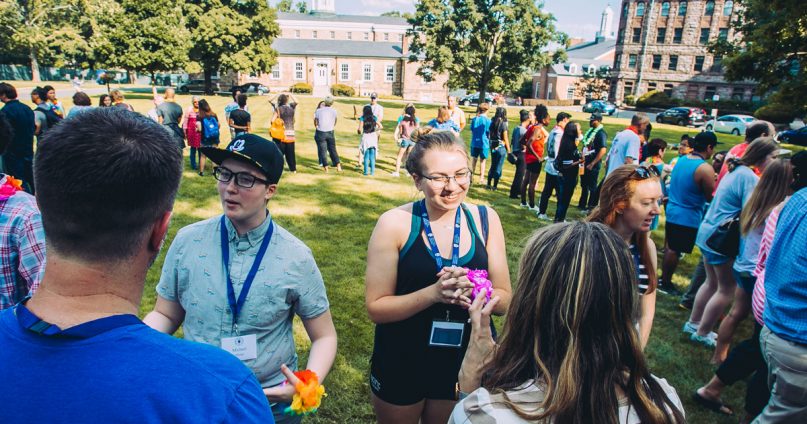The Institute for Youth Ministry provides tools and mentorship to
intergenerational teams
PRINCETON, N.J. — Princeton Theological Seminary is seeking clusters of churches nationwide to work hand-in-hand alongside experts from the Institute for Youth Ministry (the IYM) to design, test, and implement innovative tools and practices with and for young people.
The Log College Project is an 18-month program that helps congregations build intergenerational teams to forge new paths for youth ministry. Participants are being sought for the first cohort to begin as early as September 2021.
“In 2018, we received a grant to pilot this initiative as a three-year process, and we worked with 12 individual churches,” says Rev. Abigail Visco Rusert, the IYM’s director. “Through the pilot, we learned that young people are passionate about launching ministries that impact the communities where their churches are rooted,” she adds.
Abiding Presence Lutheran Church, a suburban congregation in Burke, Virginia, is one of the churches in the pilot to successfully use the process to revamp their youth ministry program.
“This new process really pushed us far beyond what we could have imagined,” says Rev. Meredith Keseley, senior pastor at Abiding, speaking on the IYM podcast, Disrupting Ministry. Her congregation hoped to foster authentic relationships among stressed and isolated young people in their church. Following the blueprint outlined by The Log College Project, the congregation created a “Parking Lot Youth Ministry” that allowed youth to engage in safe, physically distanced in-person events during the pandemic.
Another successful program rooted in The Log College Project is Table Farm & Table Bread in Sacramento, California, a collaboration between a local farm and Central United Methodist Church. There, young people care for the farm with the support of an intergenerational network of neighbors to create a more environmentally and socially just future.
“In this program, we walk alongside congregations to reflect theologically and leverage best practices from human-centered design thinking as they reshape how they connect with their communities,” Rusert says. The Log College Project provides a blueprint for churches as they journey toward “doing a new thing.”
“Churches don’t have to innovate on their own,” Rusert says. “A congregational leader is literally handed a beginning-to-end method for recruiting an intergenerational team and launching a new ministry for that community. It’s young and old designing together for the sake of the church’s mission, vision, and identity.”
Groups of 6-12 churches in one region will be selected to work together.
“We’ve designed the program so that it’s churches helping churches,” Rusert says. “The process allows congregations to also pay really deep attention to the needs of their region and how they’re meeting those needs.”
For more information about The Log College Project, watch this brief video, visit iym.ptsem.edu, or email [email protected]. Churches may apply individually or as a group.
###
About the Log College Project
The Log College Project is grounded in the Seminary’s own history of youth ministry innovation: the story of the Log College. In 1726, a pastor who lived just outside of Philadelphia, Pennsylvania, saw that churches needed well-trained leaders. Theological schools were scarce, so he built a 20×20 foot log cabin and recruited young people who showed promise for ministry leadership to his school. They did more than think deeply and complete their coursework — they lived life together and built bonds that would impact the church on a national scale. “The Log College” only lasted for a few years, but it graduated some of the fieriest preachers of the Great Awakening, who planted countless educational institutions that still exist, including Princeton Theological Seminary.
About Princeton Theological Seminary
Princeton Theological Seminary, founded in 1812, is the first seminary established by the General Assembly of the Presbyterian Church. Its mission is to educate leaders for the church of Jesus Christ worldwide. Its students and more than 11,000 graduates from all 50 states and many nations around the world serve Christ in churches, schools and universities, healthcare institutions, nonprofit agencies, initiatives for social justice, mission agencies, and the emerging ministries of the church in the 21st century.
Contact:
Nicole Pride
Princeton Theological Seminary
609-497-7760
[email protected]
###
Disclaimer: The views and opinions expressed in this article are those of the authors and do not necessarily reflect the official policy or position of Religion News Service or Religion News Foundation.





